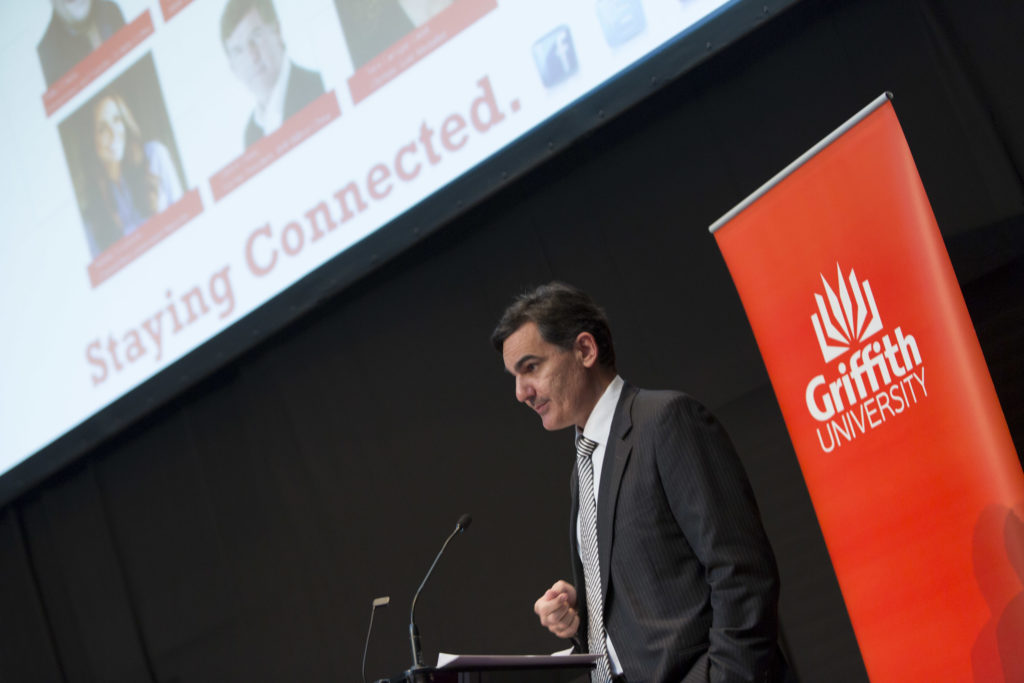This is the foreword to a series on the topic of ‘deriving impact from universities’ in the 21st century, authored by Nicholas Mathiou, Director of Griffith Enterprise.
FOREWORD

“What was happening could be described as a great ship being turned and blunted and shoved about and pulled around by many small tugs. Once turned by tide and tugs, it must set a new course and start its engines turning. On the bridge which is the planning centre, the question must be asked: All right, I know now where I want to go. How do I get there, and where are the lurking rocks and what will the weather be?”
– John Steinbeck, The Winter of our Discontent, Pan Books, 1961, p. 98
Ever since their establishment as institutions of higher education and research, universities have been different. Their evolution across the past ten centuries has seen them infused with an enduring ethos to benefit society. Irrespective of individual institutional personalities and their manifold geographical coordinates, this remains a distinguishing characteristic of any university. A university is still a community of teachers and scholars, a veritable epicenter of ideas, a concept factory, a birthplace of innovations and products that make the world a better place in which to live. A university is fuelled by thought and progress, it is a think-tank for the betterment of society, an environment where the very act of education is an exercise in social enrichment.
Certainly that is the intent.
However, we live today in a world of constant change, uncertainty and unprecedented challenges, a situation only accentuated by the global events of 2020. We find ourselves in profoundly difficult territory.
While universities, on the face of it, continue to operate according to their broad traditional ethos, they are required to continually question whether they have the societal cut-through expected of institutions of higher education and research. Are the graduates emerging from universities today true scholars, the thought leaders and change managers capable of not just meeting the demands of an uncertain environment but ready to transform it for the greater good? Are the products at the end of the university assembly line truly being utilised effectively in the delivery of social benefit? Are the concepts and new ideas of our researchers being advanced so they reach their intended targets? What are their targets? Who are their targets?
Achieving that cut-through and hitting those societal targets is no longer a matter of course. The digital revolution has seen to this. Technologies have changed the ways we think about and interact forever, not least in terms of information and know-how and how these are acquired and shared. A new currency is at play in the business of knowledge, and the value of higher education and research has come under pressure. The academic foundations and research rigour that once put the produce of a university on a higher plane are now under siege from easily accessed information (frequently camouflaged as expert knowledge). Multi-national tech companies have provided global platforms for the convenient proliferation of opinion in the absence of verified facts, which run counter to university endeavours and ethos.
What of society-serving universities and the platforms they provide for scholars and researchers and the products of their academic enterprise? It is a prescient question which has risen ominously as the university funding model has been depleted and dented and ultimately damaged by a turbulent economic landscape, competition and the loss of traditional market-share, and ever tightening public funding available to support university activities.
Now, with little warning, we find ourselves in a world where societal challenges have been amplified to new and largely unprecedented levels, not only reinforcing but raising the bar in terms of how important universities are to society. There are issues and events we cannot predict, yet we know they lie ahead, and the need for universities to be playing their part in addressing such issues has never been so clear. Unless universities can become even more proficient, further challenges of profound import lie waiting for the people of this planet.
The need for universities to reassert their relevance and influence on society had already arrived – the onset of a global pandemic and its implications for health and our abilities to deal with it through rapidly contracting economies has amplified this need. Universities have traditionally been and still remain the custodians of the knowledge most valued by society and if this evidence-based, reliable knowledge is undervalued or overshadowed by the motives of short-term, myopic commercial opportunism, the future for authentic societal benefit is at considerable risk.
There can be no doubt that the university – the institution of higher education and research, the community of teachers and scholars – is the entity best placed to meet these challenges. Society needs universities to stay relevant and provide benefit for all their stakeholders.
But staying relevant in a world of change requires change. And while a new or renewed way forward must be forged, it is incumbent on any university not only to do the right things, but to do them right. Staying relevant requires intent, focus, proficiencies, and organisational character. It means shaking off moribund shackles of intellectual isolation, and re-engineering the university mechanisms to harness the knowledge and energies of educators and researchers determined to flourish in the face of exponential change and challenges.
At the same time, the benefits of the educator’s and researcher’s work must accrue to the largest social cohort; otherwise a university will not achieve its mission and its relevance flags. Educators and researchers must be provided with the platforms to nurture their sense of opportunity so it reaches tangibly beyond campus boundaries and seeks out collaborations that can optimise the impact of their work on a broad and meaningful scale.
I share a view put forward in The Future of Universities Thoughtbook Australia (2019) that universities can turn uncertainty into opportunity by embracing adaptability and innovativeness, and recast strategies that lead to more efficient investment of resources and more productive outcomes. To do so, universities must innovate and reassert the reasons why public support of their work is both warranted and expected.
The aim of my ‘Deriving Impact from Universities’ series, is to present universities of all shapes and sizes around the world not only a sense of what is required in this climate, but a framework for how they can calibrate their operations. The key goal of the university has not changed, delivering a beneficial impact for society remains the order of the day. What has changed is the need for commercial rigour in the delivery of social benefits.
The ‘Deriving Impact from Universities’ series seeks to construct a conceptual scaffold which considers the university’s bearings in a hectic social space and in the context of the resources at its disposal, and which tends to the direction and the characteristics of the university organisation. Organisational direction and organisational character are bound together by the critical proficiencies universities must master. Then a template for a business model that delivers societal impact through strategic partnerships emerges.
This is a moment in time when the bigger picture in every sense needs to be seen once more. A sole focus on rankings and recruitment to drive outcomes must be resisted. Rather, the abiding importance of tertiary education and research must be reasserted, so these fundamentals can deliver the graduate and research outcomes that make our new world of perpetual flux a better place for all.
Read the next article from this series.

ABOUT THE AUTHOR: Nicholas Mathiou is Director of Griffith Enterprise, the innovation and enterprise office of Griffith University. He has extensive commercial experience, having established and grown innovation-based businesses and organisations. He is driven by an ambition to see great social dividends emerge through university-based innovation. He has a deep understanding of the unique challenges involved in advancing innovations within complex organisations and in dynamic environments.
Introduction image credit: photo by Lars Nissen on Pixabay


